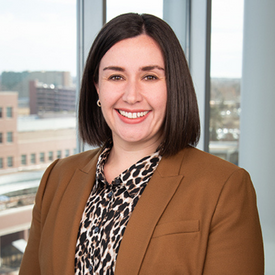What are some of the biggest challenges facing those caring for family members with Alzheimer's disease?
I think the biggest challenge I hear from caregivers is dealing with the unknown – how will their loved one do today? What does the future hold for them, both in the short and long term? Are they doing the right things or missing anything important?
A big part of our job in the CU Anschutz Memory Disorders Clinic is reassuring caregivers that they are doing the right things and providing education on common symptoms and signs of disease progression in Alzheimer's and other forms of dementia. While we can't predict the future for any individual person living with dementia, we can try to provide the major guideposts for what their disease course could be over time.
.jpg?width=531&name=Signs%20to%20Watch%20Progressing%20or%20Staging%20of%20Any%20Dementia%20Mild%20Cognitive%20Impairment%20How%20much%20help%20are%20they%20needing%20day%20to%20day%20because%20of%20their%20cognitive%20impairment%20Are%20they%20completely%20independent%2c%20even%20with%20complicated%20t%20(2).jpg)
What should I do when my loved one feels confused or angry?
None of us are perfect, and it is easy to get overwhelmed or frustrated when caring for a loved one with dementia. If you feel yourself getting upset, take a few deep breaths, and walk away from the situation if needed. Anger or agitation in a person with dementia is often the result of difficulty expressing their true needs. Don't offer too many options when trying to guess what they need, though, instead offer one activity that they enjoy that is distracting, soothing, repetitive, and simple for them. Asking the person "Can you help me with this?" when they're getting upset is a great distraction, allowing them to contribute to the household.
Is it possible for me to improve the mood of someone with Alzheimer’s or otherwise make them happy?
Staying engaged and active together, especially with physical activity and fresh air, helps everyone's mood. Good sleep is also absolutely essential for both the person living with dementia and their loved one. Reminiscing together, with family photographs, home movies, and their favorite music (usually the music we have the most connection to is what we enjoyed while in high school).
Creating a memory book together, which can then be referred back to in the future, is a great activity. If there are very prominent or frequent feelings of sadness, hopelessness, or anxiety in your loved one, though, a medication and/or therapy may be needed.
If a caregiver is feeling overwhelmed, what advice would you give them?
During the safety demonstration on an airplane, they always say, "If the oxygen masks deploy, please place the mask over your own mouth and nose before assisting others." This holds true for caregivers, too — you can't help anyone else if you're not helping yourself first. You don't need to sacrifice your own health and wellbeing for your loved one. Don't hesitate to ask others for help, most are willing and able to step in and support you. Make sure you have at least 10 minutes a day completely to yourself, for active rest and self-nurturing.
What’s one thing the general public may not know about Alzheimer’s that you’d like to share?
There’s a very broad spectrum of what Alzheimer's looks like, both in terms of the types of symptoms people have (not everyone with Alzheimer's has primarily memory difficulty, there are also vision, language, and behavior change presentations of Alzheimer's) and how severe the symptoms are for anyone person. A lot of people are only familiar with the examples of Alzheimer's disease that they see on television and in movies, which usually portrays only the later and more severe stages of the condition. While we continue to work hard on developing new treatments and eventually cures for Alzheimer's and related dementias, people living with these conditions can still have a very good quality of life.


.jpg?width=531&name=Signs%20to%20Watch%20Progressing%20or%20Staging%20of%20Any%20Dementia%20Mild%20Cognitive%20Impairment%20How%20much%20help%20are%20they%20needing%20day%20to%20day%20because%20of%20their%20cognitive%20impairment%20Are%20they%20completely%20independent%2c%20even%20with%20complicated%20t%20(2).jpg)
